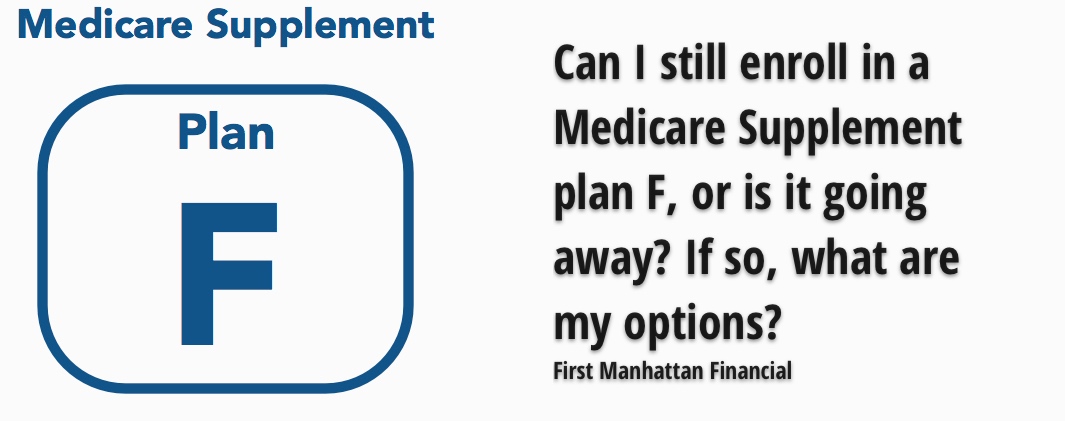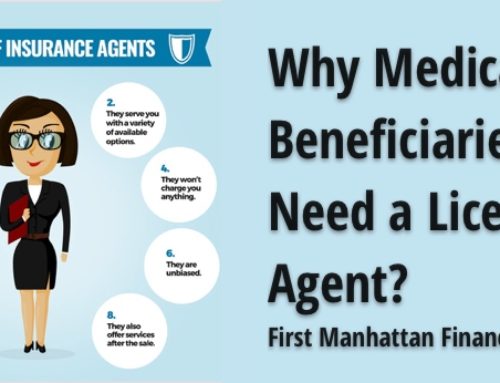This has been one of the main topic discussions between agents and Medicare beneficiaries in 2020. According to legislation from the 2015 Medicare Access and CHIP Reauthorization Act (MACRA), insurance companies would no longer be able to offer Medicare Supplement plans F and C starting on January 1st of 2020. Does that mean that beneficiaries can no longer enroll in those plans? The answer is yes, and no!
Before we answer that question, let us talk a little more in-depth about Medicare Supplement part F. Besides being one of the most popular Medicare Supplement plans, it was also the most comprehensive coverage Medicare beneficiaries could purchase.
After Medicare paid its part, typically 80% of hospital and medical cost, Medicare Supplement plan F, would pay the remaining of the expenses, leaving its members with no
deductibles or copays related to their hospital and medical expenses. When you get a Medicare Supplement Plan, your Medicare is Primary Insurance, and Supplement becomes secondary. There is no network restriction with MediGap Plans. You can see any Dr who accepts Medicare.
Medicare Supplement Plans work entirely different from Medicare Advantage Prescription Drug (MAPD) plans! It is very important not to confuse them!
Related Post: Medicare Supplements vs. Medicare Advantage: 4 Point Guide
Can Medicare beneficiaries still enroll in plan F?
Yes, if their Medicare effective date was prior January 1st of 2020, and no if they became eligible for Medicare after the 01/01/2020. This congress decision was based on several issues from Medicare government spending, on how much providers were getting reimbursed and many other reasons, basically ensuring the newly eligible Medicare beneficiaries pay at least the Medicare Part B deductible, which is $198 in 2020. Now with that, all said, what are the options left on the table for those that can still enroll on plan F and for those that do not? For Medicare beneficiaries that were already previously enrolled in the program, they could even enroll in a Plan F, or if they were already registered on plan F, they have the option to continue their coverage as long as they keep paying their premium. Now, on the other hand, newly Medicare beneficiaries, those that became part of the program after January 1st of 2020, are no longer eligible to enroll in Plan F, but can they still enroll in a comprehensive Medicare Supplement plan that could limit their out-of-pockets significantly? The answer is yes!
Private insurance companies offer Medicare Supplements, and several different plans provide different levels of coverage. Those plans are labeled by a letter, and the level of coverage of each letter that labels the plan, are standardized, in other words, a Medicare Supplement plan “F” or “G” will offer the same coverage whether you are in New York or California, or whether you enroll on company A or company B. The only difference will be in the cost of the premium, which generally will be different depending on the insurance company, that’s where working with an Independent Broker could be helpful, as Independent brokers represent typically multiple carriers and could help the prospect understand the difference among all the Medicare Supplement in their area and also help candidates compare the different rates offered by different insurance companies to assist the prospect to make the right choice.
Now, what are those options?
For those members that could no longer enroll in a Medicare Supplement plan F, another option that could offer a similar comprehensive coverage would be what’s called Medicare Supplement plan G. The main difference between plans F and G, is that with plan G, the beneficiary would have to meet their Medicare Part B deductible, which is a yearly deductible of $198 in 2020. Once that deductible is met, there will be no copayments for the beneficiary enrolled on plan G for any medical and hospital costs that are covered under original Medicare. Plan G is then an alternative to enroll into a comprehensive coverage for those that can no longer enroll on the plan F. Another type of Medicare Supplement that is also very popular and could be an alternative for those members is called the Medicare Supplement Plan N. Similarly, to plan G, Medicare Supplement plan N, also has a yearly Medicare Part B deductible of $198 in 2020. After the member satisfies that deductible, there will be a copay for doctor visits, which is up to $20 an appointment, and a copay for emergency visits, which is up to $50 a visit. Medicare excess charges are not covered under Medicare Supplement Plan N. Medicare excess charges could mean a surprise doctor’s bill. Medicare Part B excess charges are the difference between how much a doctor charges for a treatment or procedure and how much Medicare has agreed to pay for it. Doctors who accept “assignment” have decided to accept the Medicare-approved amount as full payment for services rendered. Doctors who do not accept “assignment” may overcharge the Medicare rate for a particular service by a maximum of 15%.
That is another alternative where the beneficiary can have comprehensive coverage for a lower cost in terms of premium. This is a general overview of some of the popular options that could be an alternative to Medicare Supplement plan F. However, and it is essential to note that there are other options available when it comes to Medicare Supplements. Every individual prospect has different needs, so it’s always very important to do a full need analysis with your agent before accepting any recommendation and making any decision.
Our dedicated team can help you make a decision and compare all plans available for you in your area. There is no fee for our service.
Related Post: Why Medicare Beneficiaries Need a Licensed Agent?
It is important to note that Medicare and Medicare Supplement plans do not provide you with Medicare Creditable Drug Coverage. They do not provide you with any Drug Coverage. Every Medicare Beneficiary must have a Prescription Drug Plan (PDP). They are offered through private insurance companies. If you miss your enrollment period or choose to opt-out on the Drug Coverage, you may have an LEP (Late Enrollment Penalty) when you finally decide to purchase a drug plan.
Related Post: Prescription Drug Coverage for Medicare recipients
Got Medicare Questions?
We got answers!
1-800-252-7047





